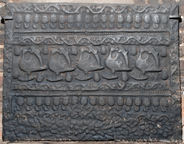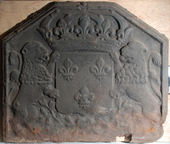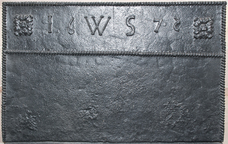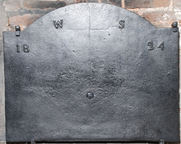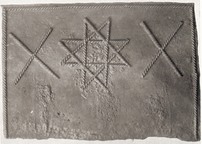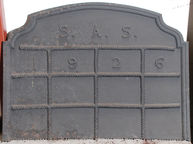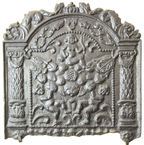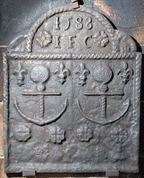-
996
Description: Quasi-rectangular shape (42.5mm wider at the bottom); border formed of strips carved with an undulating vine (top and sides); successive rows of repeated stamps: (from top) 18 'hops' or 'grape bunches' in line, horizontal fillet with line of beads below, line of vine strips, 5 birds (probably swans, a Lancastrian badge) in line with 'hops'/'grape bunches' at top and bottom of gaps, line of vine strips, line of beads with horizontal fillet below, 17 'hops'/'grape bunches' in line, and line of vine strips (partially obscured by what appears to be the repeated pressing of finger tips into the casting sand to form an extension at the base).
Notes: One of a series of firebacks incorporating the use of the undulating vine strip, and the 'swan' stamp. Copies of this fireback were advertised in the Wayte & Cheverton (Edenbridge) catalogue in the early-20th century.
Copies of this fireback are known.
- Decoration tags:
- rectangular (shape)
- trailing vine (edging)
- simple stamps
- carved stamps
- heraldic
- animals
- plants
- objects
Manufactured: in the late-16th century possibly at Pounsley Furnace, Framfield in the Weald area of England.
Current location: in private hands, Goudhurst, Kent, England.
- Attached to series:
- Pounsley series
- Vine strip series
- Swan series
- Furniture stamp firebacks
-
938
Description: Rectangular with three-facetted arch; fillet edging; shield, crown and lion supporters of the French royal house of Valois.
Notes: The arms date to before 1589 when the House of Valois was succeeded by the House of Bourbon. Lion supporters on the French royal arms are not common.
Arms: France Royal
- Decoration tags:
- rectangular with three-facetted arch (shape)
- fillet (edging)
- whole carved pattern
- planklines
- armorial
Manufactured: in the late-16th century in France.
Current location: not known.
- Attached to series:
- Foreign armorial firebacks
-
1271
Description: Rectangular shape; twisted rope edging (top and sides only); central initials, WS, in different character sets, between split date, also in different numeral sets, with a rectangular floral patera repeated at each end; below, and at a slight incline to the right, a horizontal twisted rope dividing the plate. The '5' of the date has been stamped in reverse.
Notes: A boldly cast fireback with disparate character styles. Probably acquired for the castle in the early-20th century during its refurbishment for Edward Hudson by Edwin Lutyens.
Inscription: 1 6 W S 7 5 [5 reversed]
- Decoration tags:
- rectangular (shape)
- rope (edging)
- simple stamps
- carved stamps
- individual letters
- individual numbers
- text
- plants
Manufactured: in 1675 in England.
Current location: Lindisfarne Castle, Holy Island, Northumberland, England.
Museum number: 511616 (part of the National Trust museum group)
- Attached to series:
- Miscellaneous stamp firebacks
-
343
Description: Arched rectangular shape; no edging; initials evenly spaced around arch; date split between top corners.
Inscription: W S / 18 24
- Decoration tags:
- rectangular with round arch (shape)
- none (edging)
- individual letters
- individual numbers
- text
Manufactured: in 1824 in England.
Current location: Ightham Mote, Ightham, Kent, England.
Museum number: 825375 (part of the National Trust museum group)
- Attached to series:
- Date & initials firebacks
-
437
Description: Sub-rectangular; twisted rope edging (top and sides); centre, straight length of twisted material (rope or metal) stamped eight times to form an octagram, and twice on each side to form saltires.
Notes: The octagram has magical symbolism, allegedly providing protection against evil; it is more commonly seen on French firebacks. Formerly part of the J. H. Every collection. Illustration from Schubert, 1957.
- Decoration tags:
- rectangular (shape)
- rope (edging)
- simple stamps
- apotropaic
- objects
Manufactured: in the 16th century in the Weald area of England.
Current location: Anne of Cleves House, Southover High Street, Lewes, East Sussex, England.
Museum number: 1944.24.038 (part of the Sussex Archaeological Society museum group)
Citation: Mercer, H. C., 1961, The Bible in Iron (3rd ed. Doylestown, The Bucks County Historical Society).
- Attached to series:
- Rope design firebacks
-
440
Description: Rectangle joined to low arch with cyma recta curves; ovolo-moulded edging (top and sides); grid of twelve rectangles (4 columns of 3) with twisted rope borders; initials in arch, date in top line of rectangles.
Notes: A fireback cast specially to mark the 60th anniversary of the Sussex Archaeological Society, and donated to the society by Mr John Every.
Inscription: S.A.S. / 1926
- Decoration tags:
- rectangular with canted top corners and round arch (shape)
- ovolo (edging)
- simple stamps
- individual letters
- individual numbers
- text
- objects
Manufactured: in 1926 at Phoenix Foundry, Lewes in the Weald area of England.
Current location: Anne of Cleves House, Southover High Street, Lewes, East Sussex, England.
Museum number: 1944.24.093 (part of the Sussex Archaeological Society museum group)
- Attached to series:
- Miscellaneous stamp firebacks
-
575
Description: Arched rectangular shape; cavetto-moulded edging; on each side a column of small overlapping leaves above a pedestal with a single acanthus leaf; issuing from the top of each column two ribbons, in figure-of-eight with grenade terminals, fly across the arch; within an arched rectangular central panel with bead edging three naked children disport about a swag of fruit, with a central pomegranate, suspended from the top of each column; one figure sits on the top, facing right, the other two hang symmetrically from below, with mirrored swirls behind them; along the base is a line of acanthus leaves; on top a sea serpent is curled on each end.
Notes: The design may have been inspired by the paintings of Jan Pauwel Gillemans the younger (1651-1704); he may have worked in London in 1675-8. Another version of the fireback (no. 591), probably by the same pattern-maker, has a slightly different design. Mitford collection, Petworth House.
Copies of this fireback are known.
- Decoration tags:
- 'Dutch' (shape)
- cavetto (edging)
- whole carved pattern
- planklines
- pictorial
- mythological
- humans
- plants
Manufactured: in the late-17th century in England.
Current location: Petworth House, Petworth, West Sussex, England.
Museum number: PET/M/66 (part of the National Trust museum group)
- Attached to series:
- Carolean 'Dutch' series
-
788
Description: Rectangular central panel bearing an anchor with coiled rope between two fleurs de lys, below which are two roses; this arrangement is repeated alongside; above, a semicircular arch contains the initials between two roses as in the central panel, with the date above; where the arch meets the central panel there is an arc across each corner; The top and sides panels are edged with simulated twisted rope.
Notes: One of an unusual series formed from separate panels arranged, in this instance, with the vertical panel repeated. Copies were advertised in F. Parkin & Sons (Exeter) catalogue in 1967 and 1972, and inferior copies in Kings Worthy Foundry's (Winchester) catalogue in the mid-20th century.
Copies of this fireback are known.
Inscription: 1588 / IFC
- Decoration tags:
- rectangular with round arch (shape)
- simulated rope (edging)
- carved pattern panels
- heraldic
- text
- objects
Manufactured: in 1588 in the Weald area of England.
Current location: Squerryes Court, Westerham, Kent, England.
- Attached to series:
- Armada series
- Fleur-de-lys firebacks
-
800
Description: Rectangular; plain plate with shield, supporters, ducal coronet, motto and garter of the Duke of Dorset: Quarterly, Or and gules, a bend vair.
Notes: Almost certainly the arms of Lionel Sackville KG (1688-1765), created first duke of Dorset in 1720; many different firebacks exist, all with precisely the same armorial stamp.
Inscription: HONI SOIT QUI MAL Y PENSE / AUT NUNQUAM TENTES, AUT PERFICE [Either do not attempt, or complete]
Arms: Lionel Sackville, 1st Duke of Dorset
- Decoration tags:
- rectangular (shape)
- none (edging)
- carved stamps
- armorial
- text
Manufactured: in the early-18th century in the Weald area of England.
Current location: in private hands, Withyham, East Sussex, England.
- Attached to series:
- Dorset arms series
- Sackville firebacks
- Personal armorial firebacks
